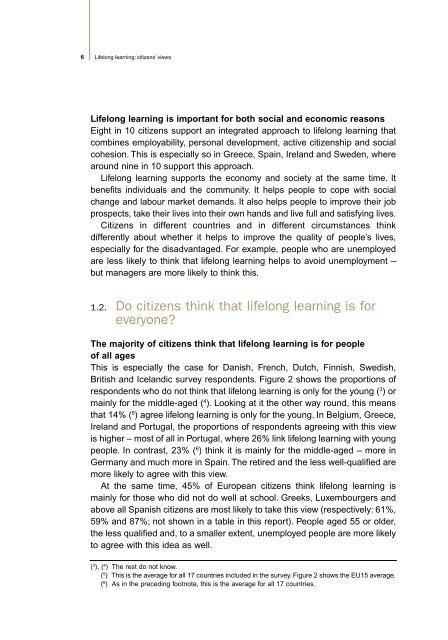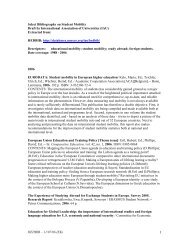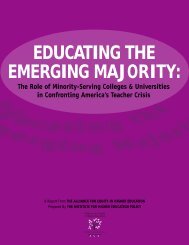Lifelong learning: citizens' views - European Commission - Europa
Lifelong learning: citizens' views - European Commission - Europa
Lifelong learning: citizens' views - European Commission - Europa
You also want an ePaper? Increase the reach of your titles
YUMPU automatically turns print PDFs into web optimized ePapers that Google loves.
6<strong>Lifelong</strong> <strong>learning</strong>: citizens’ <strong>views</strong><strong>Lifelong</strong> <strong>learning</strong> is important for both social and economic reasonsEight in 10 citizens support an integrated approach to lifelong <strong>learning</strong> thatcombines employability, personal development, active citizenship and socialcohesion. This is especially so in Greece, Spain, Ireland and Sweden, wherearound nine in 10 support this approach.<strong>Lifelong</strong> <strong>learning</strong> supports the economy and society at the same time. Itbenefits individuals and the community. It helps people to cope with socialchange and labour market demands. It also helps people to improve their jobprospects, take their lives into their own hands and live full and satisfying lives.Citizens in different countries and in different circumstances thinkdifferently about whether it helps to improve the quality of people’s lives,especially for the disadvantaged. For example, people who are unemployedare less likely to think that lifelong <strong>learning</strong> helps to avoid unemployment –but managers are more likely to think this.1.2. Do citizens think that lifelong <strong>learning</strong> is foreveryone?The majority of citizens think that lifelong <strong>learning</strong> is for peopleof all agesThis is especially the case for Danish, French, Dutch, Finnish, Swedish,British and Icelandic survey respondents. Figure 2 shows the proportions ofrespondents who do not think that lifelong <strong>learning</strong> is only for the young ( 3 ) ormainly for the middle-aged ( 4 ). Looking at it the other way round, this meansthat 14% ( 5 ) agree lifelong <strong>learning</strong> is only for the young. In Belgium, Greece,Ireland and Portugal, the proportions of respondents agreeing with this viewis higher – most of all in Portugal, where 26% link lifelong <strong>learning</strong> with youngpeople. In contrast, 23% ( 6 ) think it is mainly for the middle-aged – more inGermany and much more in Spain. The retired and the less well-qualified aremore likely to agree with this view.At the same time, 45% of <strong>European</strong> citizens think lifelong <strong>learning</strong> ismainly for those who did not do well at school. Greeks, Luxembourgers andabove all Spanish citizens are most likely to take this view (respectively: 61%,59% and 87%; not shown in a table in this report). People aged 55 or older,the less qualified and, to a smaller extent, unemployed people are more likelyto agree with this idea as well.( 3 ), ( 4 ) The rest do not know.( 5 ) This is the average for all 17 countries included in the survey. Figure 2 shows the EU15 average.( 6 ) As in the preceding footnote, this is the average for all 17 countries.
















